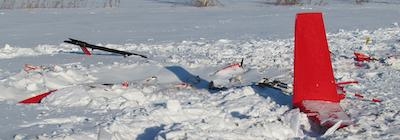Wed, Feb 20, 2019
Collision With Terrain Involving A Helicopter In Saint-Joachim-De-Courval, Quebec, Demonstrates The Risks Associated With Insufficient Recent Experience In Instrument Flight
In its investigation report (A18Q0016) released Monday, the Transportation Safety Board of Canada (TSB) underscored the risks posed by insufficient recent experience flying with reference to instruments, particularly in the case of night flights when unfavourable weather conditions are encountered and pilots lose visual reference to the ground.

On 01 February 2018, at about 1945 Eastern Standard Time, a privately operated Robinson R44 Raven I helicopter departed Saint-Georges de Beauce, Quebec, with the pilot and 2 passengers on board, on a night visual flight rules (VFR) flight to Saint-Alexis-de-Montcalm, Quebec. At 2032, the Canadian Mission Control Centre received a distress signal from the helicopter's emergency locator transmitter. At about 2135, the helicopter was found in a field in Saint-Joachim-de-Courval, near Drummondville. The helicopter was destroyed by the impact forces and a post-impact fire. All of the occupants were fatally injured.
The investigation determined that it is highly likely that the pilot encountered unfavourable weather conditions which led to a loss of visual references to the ground, and that he lost control of the helicopter as a result of spatial disorientation. Although the pilot held a valid pilot licence and a night rating, it is likely that, given his training and limited night flight experience, he did not have the necessary skills to handle a significant reduction in visual references to the ground.
The investigation highlighted several risk factors associated with night VFR flights. If pilots are not required by the Canadian Aviation Regulations (CARs) to maintain their instrument flying skills in order to use the privileges of a night rating, there is a risk that they will be unable to recognize spatial disorientation and react appropriately, increasing the risk of an accident resulting from a loss of control. Furthermore, if the CARs do not require pilots who conduct night VFR flights to undergo recurrent assessments in the form of dual instrument flights with a qualified instructor, there is an increased risk that, in the event of a loss of visual references, pilots may not be able to maintain control of the aircraft or to regain control in time to avoid an accident.
(Image provided with TSB news release)
More News
Aero Linx: Model Aeronautical Association of Australia MAAA clubs are about fun flying, camaraderie and community. For over 75 years, the MAAA has been Australia’s largest fl>[...]
Touchdown Zone Lighting Two rows of transverse light bars located symmetrically about the runway centerline normally at 100 foot intervals. The basic system extends 3,000 feet alon>[...]
“Discovery and innovation are central to our mission at Virgin Galactic. We’re excited to build on our successful record of facilitating scientific experiments in subor>[...]
How To Get A Story On Aero-TV News/Feature Programming How do I submit a story idea or lead to Aero-TV? If you would like to submit a story idea or lead, please contact Jim Campbel>[...]
Student Pilot Reported That During Rotation, “All Of A Sudden The Back Of The Plane Kicked To The Right..." Analysis: The student pilot reported that during rotation, “>[...]
 ANN's Daily Aero-Linx (05.02.24)
ANN's Daily Aero-Linx (05.02.24) ANN's Daily Aero-Term (05.02.24): Touchdown Zone Lighting
ANN's Daily Aero-Term (05.02.24): Touchdown Zone Lighting Aero-News: Quote of the Day (05.02.24)
Aero-News: Quote of the Day (05.02.24) ANN FAQ: Contributing To Aero-TV
ANN FAQ: Contributing To Aero-TV NTSB Final Report: Cirrus Design Corp SR20
NTSB Final Report: Cirrus Design Corp SR20



